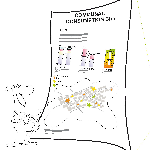
Communal Consumption Bill: an easy way to be more aware about your consumption by Transsolar Academy
 Jan Kunnas Jul 28, 2014 03:18 |
Hi, nice proposal. I linked it to my proposal in the following way:
At best we could create competition between communities!, and within with applications like the Communal Consumption Bill comparing your personal consumption to your neighbors.
https://www.climatecolab.org/web/guest/plans/-/plans/contestId/1300701/planId/1308202
|
 Climate Colab Aug 5, 2014 08:40 |
There are already a wide range of green living and "footprint" apps available but this one provides detailed information in a way that could be of great use to a wide range of users from tenants and owners to governments and developers. It would be good to have a bit more detail about how this would be developed and delivered, costs to develop it and how it would be promoted to ensure broad uptake. I can see this being very useful and of great interest so additional information about how it could be developed and how it adds value beyond existing apps would help make the case for how it could deliver results.
Combining a gamification APP with individual behaviour for some aspects of green building is a creative idea. More work is needed - maybe have a start at the SWOT and engagement strategy to show how the APP could be focused in its measurement and ensure the uptake would have a significant positive environmental impact.
|
 Javier Burgos Aug 10, 2014 10:49 |
Hello and greetings from the contest fellows! Thank you for submitting a proposal to our contest, and congratulations on making it into the top 8! We are very excited to have your proposal, and hope to see it do well.
We would love for you to keep improving your proposal prior to the next round of judging. Don't forget, both Judges Choice and Popular Choice winners will be connected with people who can support the implementation of their proposal, which may include policy makers, business executives, NGO and foundation officials, scientists, and others. They will be recognized and publicized by the MIT Climate CoLab and invited to showcase their proposals at a conference held at MIT November 2014, where a $10,000 Grand Prize will be awarded.
I would like to encourage you to take a moment and consider how you can improve your proposal, before the next round of judging. The judges comments from the 1st round have been shared with you as a comment (above), feel free to consider these as you make edits.
In addition, you may want to consider adding additional information on:
- identifying specific communities that might be best suited to tackle this effort first.
- the specific actions that each actor would need to take. Who will ultimately be driving this effort, and how will they coordinate everyone?
- The development and operating costs of this effort, with proposed dollar amounts
|
 Victor Blanco Aug 26, 2014 03:08 |
I wish you the best! Please, check my proposal in Waste Management Contest, named "REACC: Recycled Debris for Adaptation to Climate Change"; and I would apreciate your support as I supported your proposal.
|
 Climate Colab Sep 3, 2014 12:22 |
This proposal was not selected to advance to the Finalist round.
Comments from Judges:
(1) There are some good components to this, particularly around making retrofit information more readily accessible and promoting the correlation to improved comfort.
However, many energy bills have comparative information already. It is not clear how this is more attractive than something like O Power that lets users engage and compare their energy use on Facebook rather than have to download and use a separate app. Home energy dashboards have been shown to have little uptake in the past. The appeal would be for people who already analyze their energy bills and who also own their homes.
Cities are often not the energy supplier, the information would have to be provided by the utility which can often be at a regional or national scale. There would most likely have to be a policy component to get utilities to provide this information and service.
(2) Working at the city scale through the municipal rates bill is an excellent idea, as it directly accesses the prime target market, and does so through a credible medium. The use of the app is also good, and what differentiates this from other apps would be the ability to create awareness through the rates bill. The combination of top down and bottom up is good. However, collecting data for each house to create a profile that enables comparison would be an extensive exercise, and is likely to be expensive and technically challenging. The proposal provides no estimates of costs. Maybe a simplified version could provide a self-rating through the app, to be compared with a number of typical possible profiles.
|